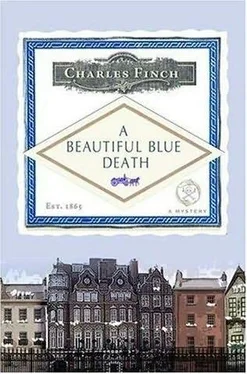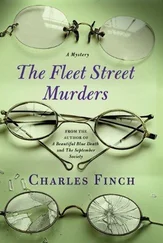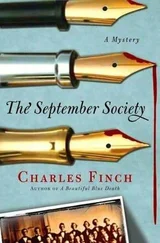Charles Finch - Beautiful blue death
Здесь есть возможность читать онлайн «Charles Finch - Beautiful blue death» весь текст электронной книги совершенно бесплатно (целиком полную версию без сокращений). В некоторых случаях можно слушать аудио, скачать через торрент в формате fb2 и присутствует краткое содержание. Жанр: Исторический детектив, на английском языке. Описание произведения, (предисловие) а так же отзывы посетителей доступны на портале библиотеки ЛибКат.
- Название:Beautiful blue death
- Автор:
- Жанр:
- Год:неизвестен
- ISBN:нет данных
- Рейтинг книги:5 / 5. Голосов: 1
-
Избранное:Добавить в избранное
- Отзывы:
-
Ваша оценка:
- 100
- 1
- 2
- 3
- 4
- 5
Beautiful blue death: краткое содержание, описание и аннотация
Предлагаем к чтению аннотацию, описание, краткое содержание или предисловие (зависит от того, что написал сам автор книги «Beautiful blue death»). Если вы не нашли необходимую информацию о книге — напишите в комментариях, мы постараемся отыскать её.
Beautiful blue death — читать онлайн бесплатно полную книгу (весь текст) целиком
Ниже представлен текст книги, разбитый по страницам. Система сохранения места последней прочитанной страницы, позволяет с удобством читать онлайн бесплатно книгу «Beautiful blue death», без необходимости каждый раз заново искать на чём Вы остановились. Поставьте закладку, и сможете в любой момент перейти на страницу, на которой закончили чтение.
Интервал:
Закладка:
As he looked through the window of his library, Lenox could see the chimneys on Hampden Lane giving off black wisps of smoke, as his own did, and he could see that all of the houses were brightly lighted, and inside all of them tea was either on the table or had just been finished.
He stepped back from his window and told himself that he would see about the note in a few minutes. Perhaps Jane would have another cup of tea for him, at any rate. For now, he picked up the evening paper again and read with great interest, while Graham arranged his things, about the parries that Disraeli and Russell were trading back and forth; for Parliament was just back in session.
Chapter 2
Even his meager boots, which had failed him all day long, were able to carry Lenox a distance as short as next door without his feet getting too wet. He tapped on the door, cheerfully calling out “Lady Jane!” through a side window.
Among the qualities that made Lenox perhaps the premier amateur investigator of his era was his memory. He could call up in his mind without any trouble crime scenes, people’s faces, and, most easily, notes from his friends. Lady Jane’s note had said: Dearest, Would you come over before supper, perhaps at a little past six o’clock? Something has happened. Do come, Charles. Yours, faithfully, amp;c. Jane
After a moment’s worry, Lenox had decided not to be alarmed. Close friends can write such notes to each other over small matters. He grew gradually more certain that it was something usual-one of her nieces was in love with the wrong man, one of her nephews had gambling debts-the sort of thing she always consulted Lenox about.
Lady Jane’s butler was an enormously fat man named Kirk. He had gone into her service when Graham had gone into Lenox’s, and the two butlers had been friends ever since, though Graham gave the impression that he slightly disapproved of Kirk’s gluttony. At Lenox’s knock, Kirk opened the door, looking graver than usual, and led him into the drawing room where Lady Jane sat, waiting alone.
She was a very pretty woman, almost pale, with dark hair, red cheeks, and red lips. Her eyes were gray and often seemed amused, but they were never cynical, and her intelligence shone out of them. She wore her usual white frock top with a gray skirt.
Her husband had been Captain Lord James Grey, Earl of Deere, and they had married when they were both twenty. Almost instantly he had died in a skirmish along the Indian border, and since then she had lived alone in London, though she paid frequent visits to her family, who lived near the Lenoxes in Sussex.
She had never remarried and was considered one of the high rulers of the best part of society. Such was the general respect for her that nobody ever so much as breathed a question about her friendship with Lenox, which was long and very close-perhaps the closest in either of their lives-but admittedly somewhat odd, given the general restrictions that governed the interaction between men and women. Lenox counted on her as the brightest and the kindest person he knew.
The drawing room was Lady Jane’s equivalent of Lenox’s library, and he knew its contents by heart. It was a rather wide room and also looked out over the street. The wall on the right side was covered with paintings of the countryside, and on the far end was a fireplace that reached nearly to the ceiling, with a bronze sculpture of the Duke of Wellington standing on the mantel, to the left of which there was a desk. In the middle of the room was a group of sofas, one of which, a rose-colored one, being where Lady Jane always sat.
And there she was when Lenox came in.
“Oh, Charles!” she said, standing and rushing toward him.
There was no deviant nephew, he saw immediately. Something had gone seriously wrong. He took both of her hands and led her back to the couch.
“Have you had your tea?” Lenox said.
“No, I’d forgotten,” she said. “Kirk-”
She stopped speaking and looked to Charles, still gripping his hands.
“Kirk,” he said, to the butler still standing at the door. “Bring us two glasses of warm brandy. Have someone come in to fix the fire, as well. And then bring us tea, with a bit of food.”
“Very good, sir.”
Lenox looked at Lady Jane and smiled. “It will be all right, old friend,” he said.
“Oh, Charles,” she said again, despairingly.
A footman came in and gave them each a small silver-handled glass. Lady Jane drank her brandy, and then drank Lenox’s when he handed it to her, while the footman prodded the fire back into shape. Then she began to speak.
“It’s ridiculous, I know,” she said, “but I feel a bit as though I’m in shock.”
“What happened, my dear?” asked Lenox.
“Do you remember a girl named Prudence Smith, Charles, a maid I used to have? We called her Prue.”
He paused to think. “No, I don’t,” he said.
“She left about three months ago to work for George Barnard, because her fiance is a footman in his house.”
“And what’s the matter with her?”
“She’s dead,” said Lady Jane, and took the last sip of brandy in her glass to steady her nerves.
“I’m so sorry,” he said.
“I know,” she said. “It’s too, too awful.”
“Do you have any idea of how she died?”
“Poison, I think. That’s what the housemaid here says. It was she who heard the news.”
“Murder?”
“Or suicide. I don’t know.”
“How appalling!”
“It’s too much to ask-”
“Never.”
“I was hoping-”
“Of course,” he said.
He looked outside. He would have to begin right away. The snow was falling even harder, and it was almost dark, but he turned back to her, smiled cheerfully, and said, “I’d better go over while the trail is fresh.”
She smiled through her tears, and said, “Oh, Charles, it’s too good of you. Especially on a day when it’s so cold.”
He sat with her a few minutes longer, making small talk, trying to comfort her, and then asked Kirk for his hat. Lady Jane walked him to the door and waved goodbye as he stepped into a hansom cab and directed the driver to Bond Street.
George Barnard would dislike this, thought Lenox as he rode along. He was a man of immense personal pride, which extended equally to his finest paintings and his lowest pots and pans. A death by poison in his house would offend both his own impervious sense of order and his certainty that most of the world ran by his clock.
He was a politician-once a Member of Parliament, though more recently he had been appointed to a variety of more permanent government roles. He and Lenox were friends, or, more accurately, acquaintances who came into frequent contact. Lenox had too little personal ambition to be counted among Barnard’s truest friends. And had begun with too much money.
Barnard, by contrast, had grown up in impoverished middle-class gentility, somewhere slightly south of Manchester-a far cry from Whitehall. How he had made his money was considered a great mystery, and London society was constantly speculating about it. Some said he had made his first fortune playing on the Exchange, or even as a merchant, but if either was true he had long since thrown it off. He had arrived in London as a conservative MP but had quickly left elective government for unelected posts.
He was currently the director of the Royal Mint, a position once held by Sir Isaac Newton, which explained why he had begun to buy the physicist’s possessions at recent auctions. He had done well as the mint’s director, a job in which he worked hard-apparently, according to most people, because he so loved the material of his labor: namely, money.
George Barnard’s single quirk was the orchid. Atop his house was a glassed-in greenroom, to which he admitted very few people and in which he tenderly cultivated his flowers, splicing their delicate hues in search of a perfect subtle shade, closely guarding the amount of water and sun each plant received. He traveled far and wide, in his rare holidays, to collect species of a commensurate rareness. The destination didn’t matter to him, unless you could call some genus of orchid a destination.
Читать дальшеИнтервал:
Закладка:
Похожие книги на «Beautiful blue death»
Представляем Вашему вниманию похожие книги на «Beautiful blue death» списком для выбора. Мы отобрали схожую по названию и смыслу литературу в надежде предоставить читателям больше вариантов отыскать новые, интересные, ещё непрочитанные произведения.
Обсуждение, отзывы о книге «Beautiful blue death» и просто собственные мнения читателей. Оставьте ваши комментарии, напишите, что Вы думаете о произведении, его смысле или главных героях. Укажите что конкретно понравилось, а что нет, и почему Вы так считаете.












